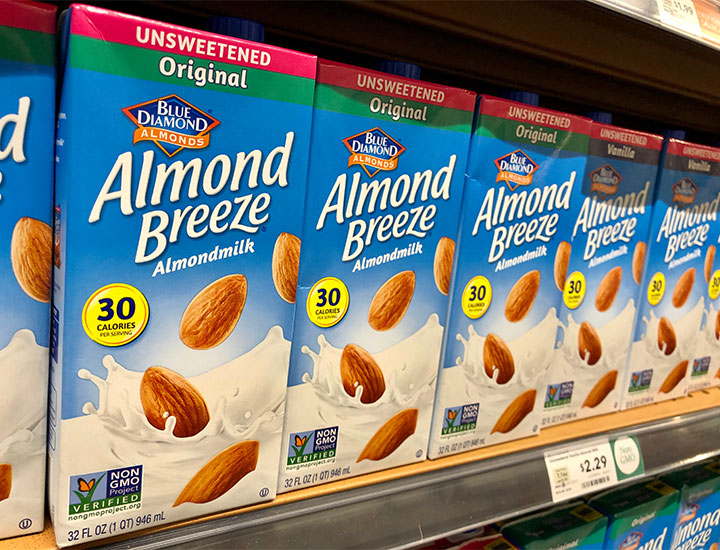
1. Almond Milk
With so many plant-based milks on the market, it can feel overwhelming to figure out which one is best for you. Almond milk, which is made of almonds, Feder explains, is one of the best options for anyone trying to lose weight as it is often the lowest-calorie option.
"Almond milk is typically the lowest in calories among milks as well as milk alternatives," Feder says. This, he adds, can help "promote weight loss" because of "the significant decrease in calories compared to other milks." Feder adds that he recommends almond milk "due to its mild flavoring" and that you can consume it "without a lot of added calories and sugar."
Richards agrees, saying that almond milk is a "staple in most dairy-free homes." Almond milk is "enriched with vitamin D," which she says is crucial for bone health. "[Almond milk] is naturally low in saturated fat and cholesterol," she also notes. However, Richards stresses opting for almond milk that is unsweetened.
However, while unsweetened soy milk offers notable benefits for weight loss, it's essential to consider individual preferences and dietary restrictions. Additionally, Nanavati emphasizes the importance of "choosing unsweetened varieties and be mindful of added ingredients or sugars," because, as we know, consuming an excess of sugar can be detrimental to your weight loss goals.
2. Soy milk
In addition to almond milk, soy milk makes a great non-dairy option for a slimmer waistline. Incorporating unsweetened soy milk into your diet can offer several advantages, particularly for individuals aiming to manage their weight effectively. Nanavati highlights some key points regarding the benefits of unsweetened soy milk, including the fact that it's rich in protein, promoting satiation and weight loss efforts.
Unsweetened soy milk provides approximately 7 grams of protein per cup, which Nanavati notes "can help with satiety and manage hunger, potentially contributing to weight loss efforts." When included in meals or snacks, protein can help individuals feel fuller for longer periods, reducing the likelihood of overeating or indulging in high-calorie snacks. By supporting feelings of fullness, soy milk can contribute to creating a calorie deficit, which is essential for weight loss.
Avoid full-fat whole milk
The worst milk option for weight loss is "full-fat whole milk," Feder says. Whole milk has a high amount of "sugar, fat and calories, that can negatively affect your blood sugar, weight status, and caloric intake," he warns.
And, when it comes to adding milk to your coffee, Best does not recommend whole milk for anyone trying to lose weight. "Many coffee consumers have a specific way they like their coffee and don't often veer from that," Best says. Unfortunately, for those wanting to lose weight, Best says full-fat dairy "might be stalling their efforts," she adds.
"These two ingredients used to lighten and sweeten coffee are high in calories, fat, and carbohydrates and are quite inflammatory," Best continues. She concludes that "not only will the calories add to weight issues, but the inflammation they cause or exacerbate can make weight loss more difficult as well." Noted!
Bottom line
Ultimately, as these experts would agree, changing to non-dairy milks can help your weight loss journey. Some kinds of plant-based milks may be better than others when it comes to carbohydrates, sugar levels, and other aspects. But, as Richards stresses, look for the unsweetened variety. Some vegan milks contain added sugars to enhance the flavor while others even contain added oils. It's easy to drink a lot of a beverage that is high in calories from sugar and unwanted fats. Next time you're at the grocery store, make sure your almond milk or soy milk contains very few ingredients with no added oils, food dyes, or sugars.


